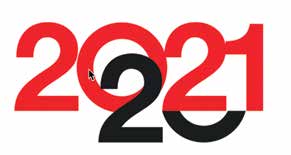
By Derek Barnes–
As we begin this holiday season and bring the year to a close, many may be asking why we were immersed in so many challenges this year. What did 2020 teach us, and what were we supposed to learn through so much struggle, sacrifice, and loss?
If we’re mildly enlightened and self-aware, we intellectually understand the value of teachable moments. They are often delivered in doses that are commensurate with lessons we haven’t learned yet. In other words, a more powerful lesson or repeated and failed attempts to get our attention may require more dramatic intervention. So often, these moments are not delivered to us on our own terms either. And more broadly applied to 2020, I wondered what this type of intrinsic error-correction system is trying to tell us today.

There’s not one single answer. Some of our underlying attitudes and self-inflicted conditions have been prevalent for decades. It just took a global pandemic to shake and wake us—confirming the link between the scale of the problem that needs resolution and the dramatic intervention that is required to get our attention. In a culture that is so self-obsessed and driven by immediate gratification, we needed something so extraordinary to grab our attention long enough so we can examine our core values and move into cohesive action.
But our 2020 teachable moment is far from over as we find ourselves entering a new phase of fighting a global pandemic. It continues its assault on many in our families and communities. The impact and losses are immeasurable. Yet, there is still hope and so much we can do in the months ahead to mitigate harm.
Perhaps the recent election is a good reminder of the continued fight necessary when so much is at stake, including our core values as a nation. Do we continue to support systems that don’t serve more diverse social interests in our country, the economic inter-operability of a global community, and changing environmental needs? What set of values are most important to us when we know there’s so much need in many parts of the country?
I am deeply struck by the persuasive conditions of U.S. food, housing, and employment insecurity. This holiday season, over 50 million people in the United States are hungry and seek food assistance. Due to the surge of COVID-19 and an economy that remains unstable, many will find themselves without permanent shelter or safe housing. The loss of business and jobs due to the pandemic has pushed the “real” unemployment rate over 12%. This number doesn’t account for workers who have stopped looking for employment, and it doesn’t consider those who need to work multiple jobs in our gig-based economy just to make ends meet.
For a country that prides itself on American exceptionalism, innovation, and wealth, we are failing to provide the basic needs for many of our citizens—especially people of color, the working class (“essential workers”), and rural and metropolitan communities. There are specific reasons for this, and we need to wake up and disengage from illusion and propaganda. Being curious, informed, critical, involved, and knowledgeable about history are more great lessons in 2020.
We can’t claim to be the wealthiest nation in the world when we can’t balance our annual budget, over 40M people live in poverty, over 80% of Americans are in debt, and the U.S. accounts for 30% of the $270T in total global debt. These dire conditions are deeply rooted in pervasive power and economic structures that keep people uneducated, distracted, and in debt. The U.S. still has access to vast resources, and a prime directive is to figure out how to unlock enormous amounts of untapped value in a fair, equitable, and distributive way. This is what a moment like 2020 can ultimately teach us.
Most understand the role that philanthropy and charitable giving play in providing essential services to many people, especially during bad economic times. People who feel the constant burden and threats should be able to rely on strong social safety nets and philanthropic networks. To individuals and corporations, who have the means to offer resources and support, please continue helping those in your communities who may need just a little more assistance to meet the tough challenges ahead.
The year genuinely exposed inequitable education and job opportunities, eroding social safety nets, and economic systems that are not sustainable. However, we shouldn’t lose sight of our collective strength, resilience, and compassion through one of the most challenging years in modern history. 2020 has also activated civic responsibility, renewed social contracts centered around racial justice and gender parity, and revealed broader philanthropic goals. Advances in these areas continue to strengthen our humanity while providing hope and opportunity to so many people.
Derek Barnes is CEO of East Bay Rental Housing Association ( www.EBRHA.com ) and a Co-Founder at g-dii Enterprises
( https://www.g-dii.com/ ). He currently serves on the boards of Horizons Foundation and Homebridge CA. Follow him on Twitter @DerekBarnesSF or on Instagram at DerekBarnes.SF
Published on December 2, 2020









Recent Comments